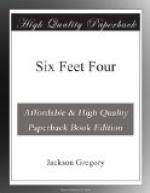They were waiting, they were going to wait ten days; that much she had overheard. Waiting for what? For some new crime, for the monster crime of all, for the last play for the last and biggest stake?
She, too, would wait. Not ten days but until she might slip away without this danger of being seen, of her errand being guessed. In the meantime she would learn what she could.
She had not forgotten that Henry Pollard was her uncle. The thought added its bitterness. But she remembered, too, the look she had seen upon Pollard’s face when she had told him that Thornton had robbed her, she remembered the look of cruel satisfaction she had surprised there more than once, and she knew that were he more than uncle, closer than uncle, she could not act otherwise than she must act now.
Then, suddenly, she sank down upon her bed, alone and lonely in the thick darkness, weary and vaguely afraid.
“Buck Thornton,” she whispered, “I am afraid I need your help as much as you need mine now!”
CHAPTER XXII
THE YELLOW ENVELOPE AGAIN!
Old man King, red eyed with wrath, had gone out after the cattle rustlers in his own direct fashion, seeking to follow the trail of running steers through the mountain passes, his eye hard, his rifle ready, his mind eager to suspect any man to whom that trail might lead. But he found only confused tracks which ran toward the state border line and which vanished before even his sharp eyes, leading nowhere.
Young Bud King, his own anger little less than his father’s, went forth on another trail, not after the running steers but after a man. And he went to the town of Dead Man’s Alley. Mentally he had made his list of the men to whom one might look to for the commission of the crime which had driven the Bar X outfit to action. Being no man’s fool, young King planned to go first to the source of the stream, as it were, and thence to travel downward seeking to see who had muddied the waters. And his “one chief bet” was that the source was in Hill’s Corners.
The result of Bud King’s investigations, so far as he was concerned, was little different from that of his father’s and negligible. But his journey to the town of the bad name was of vast importance to others.
Winifred Waverly, upon the morning after the dance, came down late to her breakfast, and found that Pollard had waited for her. Although he was not in the habit of offering her this little courtesy, she thought nothing of it at first, having enough of other matters in her brain, perplexing her. But before the meal was over she knew why Henry Pollard had waited for her.
It was plain to her that he realized that some real importance might be attached to the matter of her having seen Buck Thornton last night, of having danced and talked with him. On the ride home he had not referred to the cattle man nor had she. Now, in great seeming carelessness but with his eyes keen upon her, he spoke lightly of the dance, mentioned that he had seen Thornton talking to one of the men at the schoolhouse door and wondered why he had gone so early.




